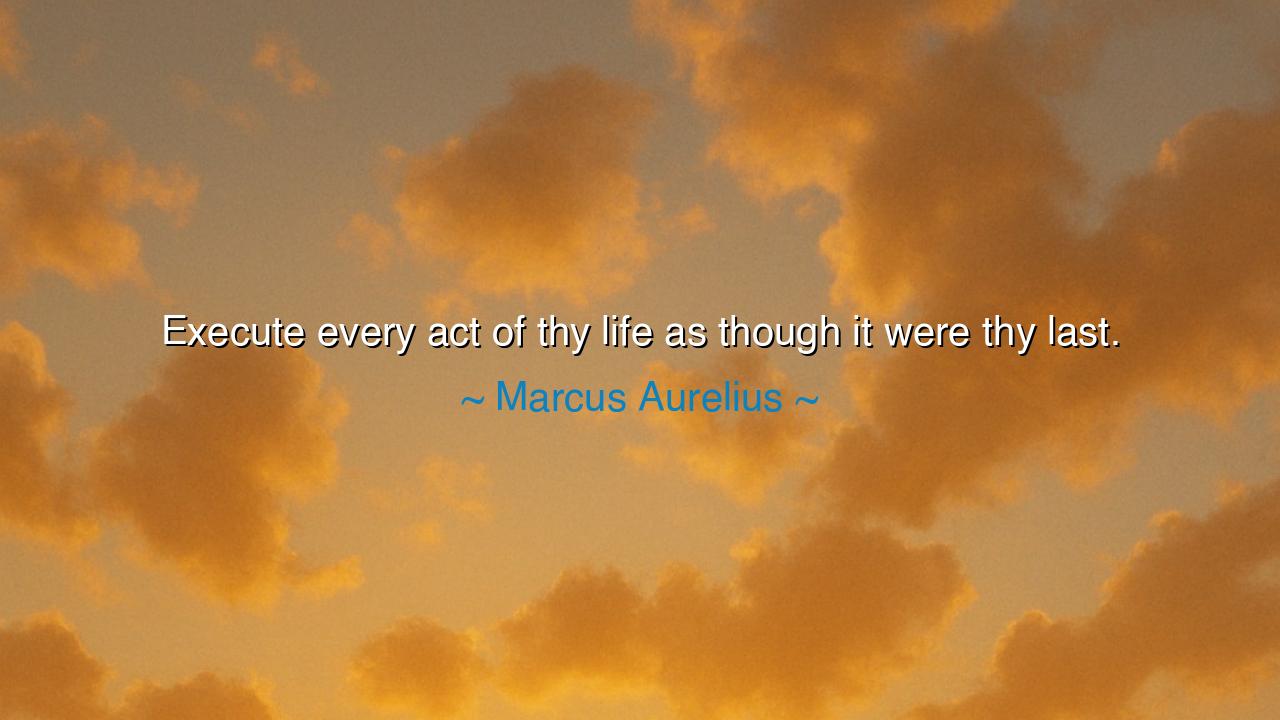
Execute every act of thy life as though it were thy last.






"Execute every act of thy life as though it were thy last." These powerful words from Marcus Aurelius, one of the greatest Stoic philosophers and Roman emperors, carry a deep, timeless wisdom. In his Meditations, Aurelius encourages us to approach life with an awareness of its fragility and impermanence. The thought that each action we undertake might be the last should infuse us with both urgency and intentionality. To live fully, he suggests, is to live each moment as if it were the final one—imbued with purpose, free from procrastination, and stripped of the distractions that often cloud our judgment.
In the ancient Stoic tradition, this philosophy was not just a moral guideline but a practical tool for living with virtue and clarity. Epictetus, another Stoic philosopher, shared similar wisdom, urging individuals to be mindful of their mortality and to act in accordance with virtue rather than passion or desire. For the Stoics, the awareness of death was not something to be feared, but something to be embraced—death, they believed, could serve as the ultimate motivator to live a life of integrity, courage, and wisdom. Marcus Aurelius, as a philosopher-king, sought to lead by example, and his teachings remain a guiding light to this day in navigating the challenges and impermanence of life.
In the life of Alexander the Great, we also see a profound example of this mindset. Though he was born into the lap of luxury and privilege, Alexander lived each day as if it were his last. His conquest of the known world was driven by a sense of urgency—a belief that time was precious and must be used to its fullest. Alexander’s relentless pursuit of glory and empire, even at the cost of personal sacrifice, mirrors Aurelius’s ideal of living as though every action is final. Alexander’s short life—he died at just 32 years old—was a testament to the way in which a sense of urgency and mortality can propel someone to leave a lasting legacy, even in a brief time. His actions were driven by the thought that his time was limited, and so, he worked relentlessly to leave an indelible mark on history.
Consider also the story of Leonardo da Vinci, who, in his own way, embodied the Stoic call to execute every action as though it were the last. Da Vinci was obsessed with time—not in the way of fearing its passage, but in the desire to make every moment count. His notebooks are filled with sketches, inventions, and thoughts, each one showing an intensity of purpose. Though he never completed many of his works, the fragments he left behind—whether in art or science—showcase a mind that approached every task with the mindset of impermanence and finality. Like Aurelius, da Vinci knew that each action, each thought, was an opportunity to create something of lasting value.
In the modern world, we often forget the preciousness of time and the weight of each moment. We become bogged down by the mundane, distracted by trivial concerns, and procrastinate on what truly matters. But Aurelius’s words are a call to awaken. They urge us to live with purpose, to be present in every action, and to avoid the temptation of wasting the time we have. Whether it’s in our personal lives, our work, or our relationships, we must act as though each moment is final, for we never know when it might be. Every conversation we have, every choice we make, carries the potential to shape our lives and the lives of those around us.
The lesson here is one of awareness and intention. To live with the awareness of mortality is not to be consumed by fear or despair, but to be inspired to act with purpose and meaning. If we knew that each act might be our last, how much more conscious would we be of our actions? How much more present would we be in our relationships? How much more focused would we be in our work? This is the gift that Aurelius offers us: the call to live fully, not in the sense of indulgence or excess, but in the sense of engagement and integrity.
In practical terms, we can embrace this wisdom by living deliberately. Each day, let us set aside the distractions, the worries, and the mundane tasks that consume our time. Let us focus on what truly matters—whether it’s a creative endeavor, a meaningful conversation, or a task that serves the greater good. Let us strive to be present, to be mindful, and to approach each moment with the same urgency and purpose that Aurelius spoke of. In doing so, we will find that our lives are filled with more meaning, more connection, and more fulfillment. Let us act today as if it were our last, and in doing so, we will live more fully than we ever imagined.






AAdministratorAdministrator
Welcome, honored guests. Please leave a comment, we will respond soon